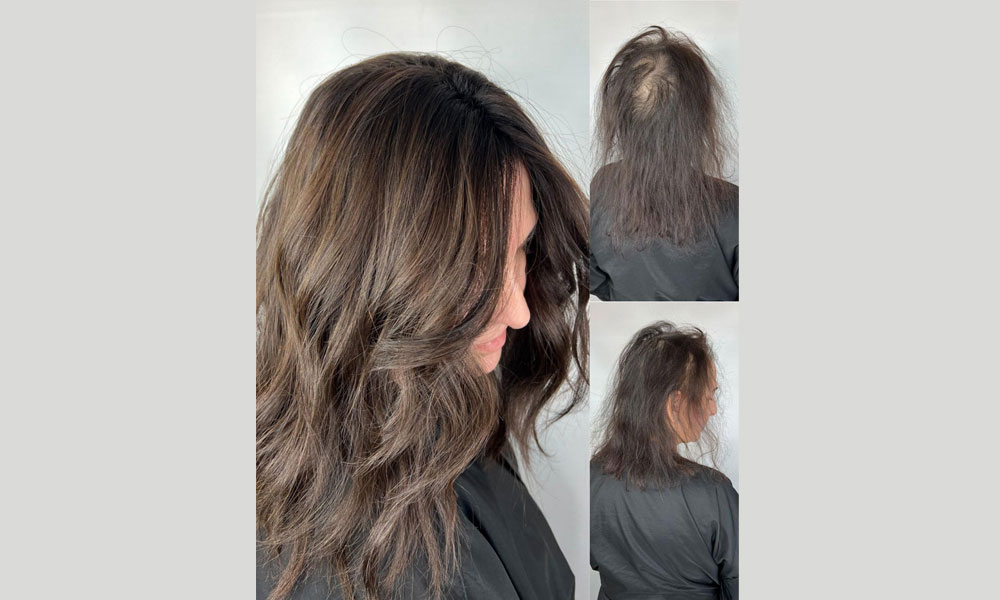
GLP-1 Medications and Hair Loss: Understanding the Connection
As a hair replacement specialist, I’ve been hearing more and more questions about the relationship between weight loss medications and hair health. If you’re on a GLP-1 medication like Ozempic, Wegovy, or Mounjaro and noticing changes in your hair, you’re not alone. Let’s dive deep into what’s really happening and how you can support your hair during your weight loss transformation.
The Unexpected Side Effect: Hair Shedding
Weight loss medications have been revolutionary for many people struggling with weight management, but they can come with an unexpected companion: temporary hair loss. Although weight loss medications don’t directly cause hair loss, rapid weight loss often does. This phenomenon, known as telogen effluvium, is more common than you might think.
What is Telogen Effluvium?
Telogen effluvium is a temporary form of hair loss triggered by significant body changes. When you experience rapid weight loss or metabolic shifts – which can happen with GLP-1 medications – your hair follicles can enter a resting phase, leading to increased shedding.
The Science Behind the Shedding
Several factors contribute to hair changes during weight loss:
1. Nutritional Shifts
Rapid weight loss can impact your body’s nutrient distribution. Hair follicles are particularly sensitive to changes in:
- Protein intake
- Vitamin B12 levels
- Vitamin D
- Mineral absorption
2. Hormonal Fluctuations
GLP-1 medications can cause hormonal changes that temporarily disrupt your normal hair growth cycle. This doesn’t mean permanent hair loss – just a temporary adjustment.
3. Metabolic Stress
Your body experiences significant stress during rapid weight loss, which can manifest through hair shedding. Think of it as your body’s way of conserving energy and resources.
Proactive Strategies for Hair Health
Don’t worry – there are several ways to support your hair during this transition:
Nutritional Support
- Increase protein intake
- Consider hair-specific supplements
- Ensure balanced vitamin and mineral consumption
Hair Care Techniques
- Use gentle hair care products
- Avoid excessive heat styling
- Practice scalp massage to stimulate circulation
- Consider professional treatments designed for hair restoration
When to Seek Professional Help
While temporary hair shedding is normal, persistent or significant hair loss warrants professional attention. As a hair loss specialist, I recommend:
- Consulting with your healthcare provider
- Getting a comprehensive hair and scalp assessment
- Developing a personalized hair restoration plan
Personalized Hair Replacement Solutions
Experiencing hair loss can be challenging, but you’re not alone. I offer comprehensive hair replacement solutions for men and hair replacement solutions for women that are tailored to your unique needs. Whether you’re dealing with medication-related hair thinning or other forms of hair loss, there are advanced options to help you regain your confidence.
The Good News
Remember, this hair shedding is typically temporary. Most clients see their hair return to its normal growth cycle within 6-12 months. Your body is simply adjusting to significant metabolic changes.
Final Thoughts
Weight loss is a process, and like any process, it comes with unexpected twists. Your hair health is an important part of this transformation. By understanding what’s happening and taking proactive steps, you can support both your weight loss goals and your hair’s vitality.
About the Author
Tia Coles is a hair extension and hair replacement specialist dedicated to helping men and women navigate hair health challenges with compassion and expertise. Schedule a consultation to find out which hair replacement solution is best for you.
Disclaimer: This blog post is for informational purposes only and should not be considered medical advice. Always consult with your healthcare provider about any health concerns or medication effects.
Ready to discuss your hair health goals? Schedule a consultation
